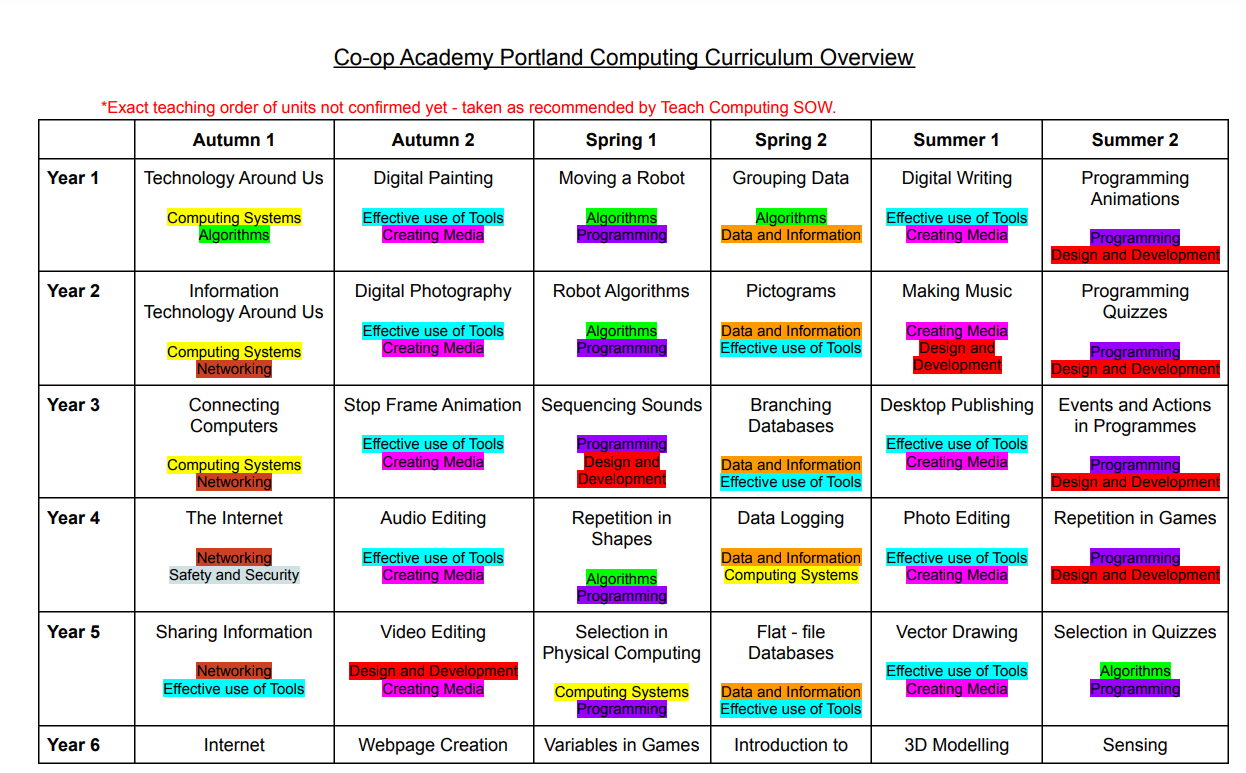Computing
Our vision is to support children in becoming creative, independent learners and ensure they develop a healthy relationship with technology.
At Co-op Academy Portland, we value and recognise the contribution that technology can make for the benefit of all pupils, staff, parents, the Academy Community Council and society.
We strive to provide safe opportunities in computing to motivate, inspire and raise standards across the curriculum. Everyone in our school community will be equipped with the digital skills to meet developing technology with confidence, enthusiasm and prepare them for a future in an ever-changing world.
We want our children to be creators and innovators, not just mere consumers of digital content. The idea of children as digital creators is what underpins our planning and computing units. Our children are taught to understand that technology is an integral part of modern life and the key to the future is to harness and understand technology’s potential. Computing is a constantly evolving subject that involves solving complex problems, being able to collaborate with others, learning from mistakes and refining solutions.
Our computing curriculum is designed to be easy to follow, with logical sequenced steps that will equip all children with the essential skills and knowledge they need to use technology safely and creatively. When planning, we ensure that children can build on their understanding, as each new concept is taught with opportunities for children to consolidate and reapply their skills and knowledge throughout the year. Each computing unit is planned to provide new challenges and variety, to ensure we keep the child’s interest at a maximum. Our computing units are organised into a series of hour-long whole-class lessons, with the children working together on the same lesson content at the same time. Every unit has reflection and assessment points. This ensures that all children can process and articulate the concepts within the lesson before moving to the next activity, with no pupil left behind. Children create their own digital learning journals that record their understanding and tell their own story of the content they create. These journals and the content the children create illuminate their progression as digital storytellers, problem solvers and showcase mastery of computing.
Here at our school, we believe safety is paramount. We promote and model a balanced digital life, recognising that amongst the many positives that technology has to offer, risks exist and children need to be taught to manage their digital lives properly. We strive to model and educate our children to use technology creatively, positively, responsibly, and safely. Our curriculum supports the key aims of the government’s Internet Safety Strategy (Digital Literacy / UK Council for Child Internet Safety (UKCCIS) framework) of supporting children to stay safe and make a positive contribution online, as well as enabling teachers to develop effective strategies for understanding and handling online risks.
At Co-op Academy Portland, the requirements of the Computing Curriculum are taught through half-termly units, where the children have access to their own Chromebook. The curriculum at our school is carefully mapped out to ensure that pupils acquire knowledge, vocabulary, and skills in a well-thought-out and progressive manner, with each teacher following the Knowsley Computing Scheme of Work and progression document.
The Knowsley scheme highlights the knowledge, skills, and vocabulary for each group year and is progressive from year to year. New learning is based upon what has been taught before and prepares children for what they will learn next. Every unit has a clear endpoint and an end product which children work towards on their learning journey. The teaching style that we adopt is as active and practical as possible, although at times we do give children direct instruction on how to use hardware and software.
Our Computing units and progression model is broken down into four strands that make up our computing curriculum. These are Essential Skills, Computer Science, Information Technology, and Digital Literacy.
- Essential Skills: ensure children have the core basic skills to use multiple devices. This is designed to promote independence.
- Computer Science: underlines the knowledge and skills relating to computational thinking, coding, algorithms and networks.
- Information Technology: underlines the knowledge and skills relating to digital communication, creating multimedia content and data representation/handling.
- Digital Literacy: underlines the knowledge and skills relating to online safety and technology in society.
Mrs Ali is our Computing subject lead, supported by Mr Ogilvie our Curriculum Lead.

